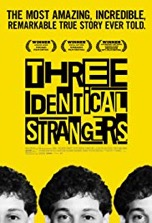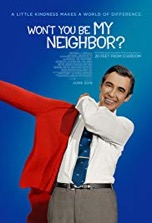Three Identical Strangers (PG-13)

Starring: Silvi Alzetta-Reali
January 2018
Warning! This is NOT a movie review. This is a critique of the film. Intended to initiate a dialogue, the following analysis explores various aspects of the film and may contain spoilers. Views are my own and elaborate on comments that were originally tweeted in real time from the back row of a movie theater @BackRoweReviews. For concerns over objectionable content, please first refer to one of the many parental movie guide websites. Ratings are based on a four star system. Happy reading!
The saying “the truth is stranger than fiction” certainly applies to director Tim Wardle’s documentary Three Identical Strangers, which chronicles the incredible true story of how triplets, who were separated at birth and raised by three different families within a 100 mile radius, meet under rather unlikely circumstances. The remarkable story made national headlines in 1980 and transformed the trio into an overnight sensation. The three 19-year-olds appeared on a host of news shows and TV talk shows like “The Phil Donahue Show.” The three brothers leveraged their newfound celebrity into owning and operating a NYC restaurant, appropriately named Triplets. But things took a dark turn when the siblings learned that they were part of an unethical study. Although the ostensibly outlandish premise initially grabs our attention, it’s the judiciously inserted interviews of the brothers, their parents and friends that holds our interest throughout the 1 hour and 36 minute film. The only downside here is that the movie overstates its case; certain archival clips are shown three times, which makes it feel like the story is being stretched out to fill a feature length movie. Also, significant screen time is dedicated to adoption agency insiders who, sadly, offer scant insight into the illegal “twin study.” Although the film’s resolution isn’t very satisfying, Strangers broaches some important topics, such as: nature vs. nurture, our irresistible need to play God, sibling bonding and the vitally important role parents play in the development of their kids. The movie is equal parts heartwarming and heartbreaking. Even though it focuses on three different people, Strangers is one of a kind.
Rating: 3 out of 4 stars
Won't You Be My Neighbor? (PG-13)

Starring: Joanne Rogers
June 2018
Warning! This is NOT a movie review. This is a critique of the film. Intended to initiate a dialogue, the following analysis explores various aspects of the film and may contain spoilers. Views are my own and elaborate on comments that were originally tweeted in real time from the back row of a movie theater @BackRoweReviews. For concerns over objectionable content, please first refer to one of the many parental movie guide websites. Ratings are based on a four star system. Happy reading!
The documentary spotlighting the life and legacy of Fred Rogers, entitled Won’t You Be My Neighbor?, takes us on a journey from Rogers’ humble beginnings as “Fat Freddy” all the way through his career as the host of a children’s variety program on PBS to his death in 2003, plus ruminations and speculations regarding the impact his life had on society. Strewn throughout Morgan Neville’s film are archival clips of “Mister Rogers’ Neighborhood,” interviews with Rogers’ family, coworkers, guests on his TV program (Yo-Yo Ma) and selected spoofs (Eddie Murphy) of Rogers, which he took with a gracious sense of humor. Despite the fact that he was captivated by the medium and felt it had incredible potential to educate kids, Rogers hated TV. He took it as a personal challenge to fill the programming gap with quality, substantive and meaningful content that had a positive message and affirmed that all kids…all people, are special. As a Presbyterian minister turned TV host, Rogers regarded kids as his congregation. Although he didn’t proselytize in the conventional sense, Rogers’ positive message of “love thy neighbor” (Mark 12:31) permeated the themes and topics of his show, a message needed now more than ever. In his later years, Rogers produced special shows that dealt with tragedies such as the Challenger explosion in 1986. Rogers never shied away from difficult issues such as divorce, death or unplanned pregnancy and used his child psychology background to soothe the fears of children during traumatic times ranging from Robert F. Kennedy’s assassination all the way up to 9-11. Rogers took flack for being a friend to the gay community and raised eyebrows during one of his shows when he invited a black man to wash his feet in the same kiddie pool where he was cooling off his feet. Also, Rogers’ message that everyone is special has been blamed for producing the narcissistic generations of kids who grew up during the decades his program was on the air. Dubious accusations aside, Rogers was a decent man who genuinely loved kids and, by all accounts, was the same on and off camera—a refreshing role model that stands in direct opposition to the scandalous scoundrels of our modern society (i.e., the Weinstein’s of the world). The only downside here is that, like Rogers’ show, Neighbor is slowly paced at times. On the plus side, the movie gives us generous glimpses into Rogers’ quirky mentality. The numerological significance of 143 in Rogers’ life is a fascinating aside. Times have changed and Rogers now seems like a milquetoast caricature of a 50s dad…and the sweaters do little to discourage that notion. Rogers is an effective barometer for how far we’ve descended from the kinder, nobler and more inclusive world portrayed in his neighborhood. At movie’s end, there’s a profound feeling of sadness; certainly at the passing of a great man, but also at the closing of an era. Will we ever again see such a period of decency and goodwill toward our fellow human beings? All things considered, this is an inspirational, tear-jerking documentary and a nostalgic trip for those of us who were privileged enough to grow up watching “Mister Rogers’ Neighborhood.” So now the only question is: Won’t you be my neighbor?
Rating: 3 out of 4 stars
March of the Penguins (G)

Starring: Morgan Freeman
July 2005
“Chillingly Superb Survival Documentary”
Five minutes into March of the Penguins, I asked myself, “How can they make a full-length feature out of this?” I know I probably wasn’t alone in my sentiment—on the face of it, a documentary about Emperor penguins schlepping and sliding across the gelid Antarctic plains is neither high art, nor highly entertaining. And yet, at the hour and a half mark, when images of the foreign production unit interacting with friendly penguins serve as a backdrop for the rolling credits, I almost felt shortchanged because I had thoroughly enjoyed the film and wanted to see more.
Besides French director, Luc Jacquet, and his team of skilled cameramen, the single greatest contributor to this Warner Independent/National Geographic film is Morgan Freeman’s superlative narration. Freeman’s soothing baritone lends the movie an undeniably comforting degree of warmth that takes the edge off the visually chilling vistas and arctic landscapes (the first time the theater’s AC kicked in, I quickly threw on my jacket).
The movie wastes no time in depicting the plight of the penguins as they waddle seventy miles inland to an icy plain set aside as their mating grounds. The penguins pair off and mate; and after several months the females produce one egg each, which the fathers must keep warm under their downy coats until the mothers return from their feeding…seventy miles to the ocean and seventy miles back. Huddled together to stay warm, the male penguins keep their eggs warm until they hatch…the fathers must feed the chicks with the last meal they’ve stored up for just such an occasion. The males, now on the brink of starvation, anxiously await the return of the females. The females return just in the nick of time and then the fathers are off to feed. When the penguin families are finally reunited, they only have a short amount of time together before they must return to the coast and start the cycle all over again.
The intricacies and delicate balances in the survival of the penguins are astounding…if any part of the cycle is interrupted, the penguins become extinct. In some ways the “stars” of this film are more human than most movies featuring homo sapiens: the opening shots of penguins ambling along the frozen plain are strangely human in appearance and when one mother (whose chick died in the frigid air) tries to steal the chick of another mother, the group intervenes, displaying a degree of swift justice that our courts could only dream of.
March of the Penguins is the sleeper hit of the year and is definitely one documentary that won’t leave you out in the cold.
Rating; 3